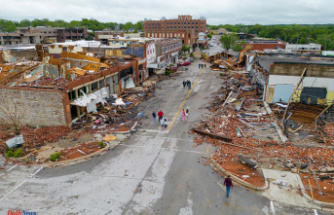"Oak Fire" broke out Friday in Mariposa County, near Yosemite National Park and its giant sequoias, and has already moved more than 2,500 hectares, destroying ten properties and damaging five others, according to a Saturday bulletin from the California Department of Forestry and Fire Protection.
Several roads were cut and several areas were ordered to evacuate, while the fire, of "extreme activity" and fought by around 400 firefighters, was not under control at all on Saturday, according to the same source.
According to a climatologist from the University of California at Los Angeles, Daniel Swain, the fire "spread significantly in almost all directions", "in a context of high fuel load and extreme drought".
“The series of relatively small, non-destructive wildfires that have plagued California so far this season appear to be over,” he added on Twitter.
The American West has already experienced forest fires of exceptional magnitude and intensity in recent years, with a very marked lengthening of the fire season, a phenomenon that scientists attribute to global warming.
- Tornado -
Witnesses posted images on social media of a huge, impressive whirlwind of thick smoke rising from the forest, like a tornado, a dangerous pyrocumulus phenomenon that can fuel the fire.
This fire is one of the most dramatic consequences of the heat wave affecting the United States this weekend, in a localized area between California and Oregon to the west but much more extensively in the center and northeast.
"Extreme heat will continue across the central United States and spread to the northeast this weekend, with many temperature records expected to be set today (Saturday) and Sunday across the region." , announced the National Weather Service (NWS).
"This heat will fuel severe weather across the northern Midwest today (Saturday), with a significant threat of damaging winds, large hailstones and a few tornadoes," the NWS continued on its bulletin.
Stifling heat was particularly felt in the capital Washington, where temperatures were to flirt with the symbolic bar of 100 degrees Fahrenheit (37 to 38 degrees Celsius). New York was not spared, with temperatures close to 35 degrees.
The temperature could also reach 43 degrees in parts of Utah (west), Arizona (south) and the northeast, according to NWS.
- Emergency state -
In Boston, where Mayor Michelle Wu has declared a "state of heat-related emergency", providing for the opening of municipal places to cool off and swimming pools open longer, it could be 37 degrees on Sunday.
This week, US President Joe Biden once again underlined the "clear and immediate danger" posed by climate change, "an existential threat to our nation and the world". But its room for maneuver is limited in Congress and by the Supreme Court.
The planet has already recorded several heat waves this year, such as in July in Western Europe or in India in March-April. Their multiplication is an unmistakable sign of climate change, according to scientists.
In June 2021, an extremely rare "heat dome" wreaked havoc on the entire west coast of the United States and Canada, killing more than 500 people and causing major fires, with temperatures approaching 50 degrees.












